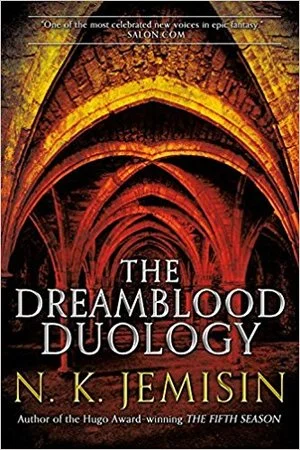Book Review: The Obelisk Gate
Here is yet another middle book in a series that strongly surpasses the first book. The Obelisk Gate is a stunner, containing several shocking developments, many exciting displays of orogeny and more than its fair share of character drama, making for a book that should top Best Of lists for 2016.
The Obelisk Gate picks up the story of Essun as she and her stone-eater companion Hoa are accepted into the Castrima comm. There, Essun encounters Alabaster again - and he's dying. He tasks her with finishing what he started, and as part of that, Essun must learn everything she can about the mysterious obelisks, while also integrating into and defending Castrima. Meanwhile, the book's other viewpoint follows Essun's daughter Nassun - first as she flees south with her father and then as she begins to develop her own orogenic powers under the watchful eye of her mother's former Guardian Schaffa, who's not quite all there anymore...
I'm a bit unusual in that I enjoy well-written exposition, and that's part of why I enjoyed The Obelisk Gate more than The Fifth Season. I love learning about the world and its history, and we get a lot of that here as a dying Alabaster passes on as much knowledge to Essun as he can. If that's not for you, then you may find some of the middle sections of this book too slow.
These sections are excellent though for the answers they provide. Finally, we understand why Father Earth hates orogenes, and the actual geological/astronomical problem underlying the series. I'm not going to spoil it, but it's a doozy and there are several warring factions, each with a different solution. Essun is caught in the middle, trying to do her best to follow her old mentor's instructions and learn how to use the vast network of obelisks in the sky.
And even this doesn't answer all the questions. The stone-eaters play a much larger role in this book, but their motivations are still murky. Who made Castrima and why? What did Hoa do, way back in the past, to cause all this? Is this actually our world far in the future (an idea that has been growing on me for some time)? The list goes on and on.
Jemisin balances the necessary exposition of Essun's storyline with the excitement of Nassun's journey. It is through Nassun that we begin to learn more about who and what the Guardians are, and we see firsthand in a way we didn't really with the Damaya chapters in The Fifth Season just how hard it is for an orogene to learn control.
Nassun also has some of the best character development in the book as she comes to terms with her relationships to both her parents. While she hates her mother for her strictness, as she begins her training in earnest she is forced to realize that her mother was hard for a reason. And as she embraces her orogeny, she has to confront her father's hatred for orogenes and accept that he will never truly love her as she is.
These are hard lessons for a young girl to learn, and Jemisin writes these revelations very naturally. If there's any flaw, it's that Nassun often seems older than her true age, but I think that can be explained by the level of trauma she's experienced.
This isn't to say that Nassun gets all the exciting sequences though. There's a very memorable scene in the control room of Castrima, where Tonkee gets a little too enthusiastic and Essun is forced into action. And the climax of the novel rests with Essun, as she turns on the obelisk network for the first time to defend Castrima and search for her daughter. That in particular is a thrilling sequence, and the book caps it off with an explanation of why Essun's sections to date have been in second person.
This book is such a wonderful blend of elements. It carries forward the thrilling, unique world that Jemisin built in The Fifth Season, gives us a few answers and then tantalizes us with the question of what's to come. I can only imagine that The Stone Sky will be as amazing, and it's in my top three books that I'm anticipating in 2017.
Grade: 5/5
Memorable Quote
“He laughs. This hurts him, too, but it’s a laugh that makes your skin prickle, because it’s the laugh of the Yumenes-Allia highroad. The laugh of a dead node station. Alabaster was never mad; he’s just learned so much that would have driven a lesser soul to gibbering, that sometimes it shows. Letting out some of that accumulated horror by occasionally sounding like a frothing maniac is how he copes. It’s also how he warns you, you know now, that he’s about to destroy some additional measure of your naivete.”






